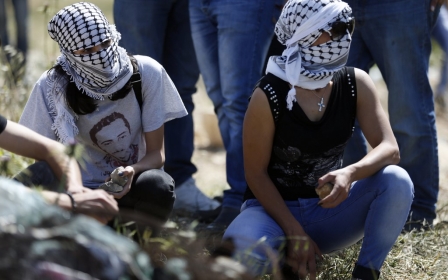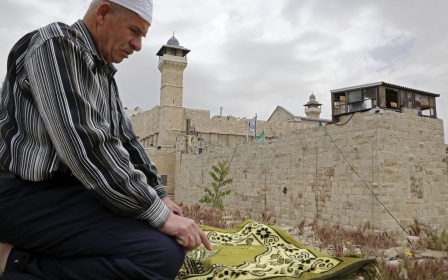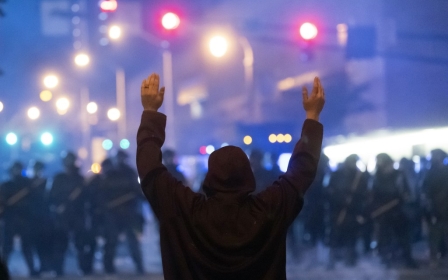Israeli press review: Coronavirus legislation threatens essential freedoms

Civil rights and coronavirus
A proposed law to tackle the coronavirus outbreak in Israel will restrict essential rights and civil liberties, Calcalist news reported.
The Israeli Knesset voted on the first reading of a draft bill earlier this week that would introduce restrictions and temporary measures for 10 months.
The draft bill needs another two rounds of votes to be enshrined into law, which may happen before the weekend, though it normally takes about three weeks to vote on bills, according to Calcalist.
The bill would enable Israeli Prime Minister Benjamin Netanyahu's government to declare restrictions, including imposing closures, forcing people to self isolate and giving police the power to disperse crowds in cities and towns, which could mean imprisonment and fines.
New MEE newsletter: Jerusalem Dispatch
Sign up to get the latest insights and analysis on Israel-Palestine, alongside Turkey Unpacked and other MEE newsletters
The proposed law also has the power to regulate social distancing rules to keep two metres apart, which would affect visits to shops, malls and restaurants. The government may approve these regulations without requiring a green light from the Knesset.
Israel eased coronavirus restrictions in May after recording 17,342 Covid-19 cases and 290 deaths.
The pandemic hit the country during its third election campaign in a year and led to the Israeli cabinet approving emergency regulations in March on the population's movements to halt the spread of the disease.
The three-month emergency regulations will come to an end in June.
Annexation of the West Bank
Israel's top military and intelligence officials, including army Chief of Staff Aviv Kochavi, have discussed "war game" scenarios after Israel’s planned annexation of the occupied West Bank in July.
According to Israel Hayom newspaper, Kochavi spoke with military officials about such possible scenarios and "extreme situations" that may escalate after the planned annexation, including severing ties with Jordan and the Palestinian Authority, and anticipated protests on the Gaza Strip periphery with Israel.
The newspaper reported that the Israeli army has a special programme dubbed 'Dawn in Mountains', which includes training forces and commanders, close coordination between internal intelligence and police, and full-scale deployment of weapons to ready for annexation.
The areas slated for annexation amount to about one-third of the West Bank and include a 97km (60-mile) stretch along the border with Jordan, including two crossings - the Sheikh Hussein Bridge and the al-Karameh Bridge, also known as Allenby crossing.
The area is strategic in location and also rich in minerals and agriculture.
Israel has long prepared for the annexation of the border territory, building a network of highways including the Allon Road to separate the Jordan Valley from the rest of the West Bank.
The Jordan Valley and the Dead Sea are parts of the West Bank, which Israel has occupied since the 1967 Middle East war.
Jordan shares 335km of border with Israel and the West Bank, and Amman's security coordination is highly treasured by Israel's military and intelligence.
Nation-State Law
The chairman of the Israeli Foreign Affairs and Defence Committee in the Knesset, Zvi Hauser, called on the Israeli government to invoke the Nation-State Basic Law to prohibit Palestinian families from submitting applications to reunite with spouses and partners who hold Israeli citizenship.
In July 2018, Israel passed a law giving Jews supremacy over all non-Jewish Israeli citizens, and this is the first time an Israeli legislator has called for invoking the law to prevent unification of Palestinian families.
Less than 500 words long, the Nation-State Law accords exclusive "national self-determination" rights to Jewish people, wherever they may live, in Israel or abroad, and whether or not they even hold Israeli citizenship.
Haaretz reported that the Israeli government asked a Knesset committee to extend for another year a provision in the Citizenship and Entry into Israel Law, which prevents the unification of Palestinian families "for security reasons."
The committee approved the extension in a vote of 41 to 13.
Hauser said: "Israel has been in an ethnic conflict with the Palestinian people since it was established. It will continue to be demanded that Israel grant citizenship cumulatively to tens of thousands of people with a basic hostile connection to the state, especially to the idea enshrined in its constitution as the nation-state of the Jewish people."
He added that the Nation-State Law is "not a dead letter" on the Israeli statute books.
* Israeli press review is a digest of reports that are not independently verified as accurate by Middle East Eye.
Middle East Eye delivers independent and unrivalled coverage and analysis of the Middle East, North Africa and beyond. To learn more about republishing this content and the associated fees, please fill out this form. More about MEE can be found here.




